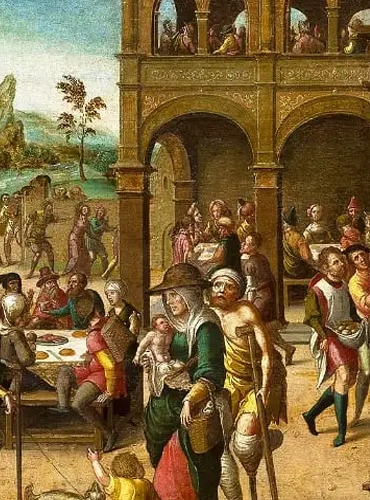Tuesday of the Thirty-first Week in Ordinary Time – Lk 14:15-24
In today’s Gospel, one of Jesus’ fellow dinner guests remarks “Blessed is the one who will dine in the Kingdom of God,” meaning, blessed is the one who makes it to heaven, and Jesus replies with a parable about the people who will make it there. To make sense of the parable, we should consider, first, the way banquet invitations worked, second, the excuses of the people who refused to come, and, third, the people who were finally invited and came.
First, Biblical historians confirm, and Luke makes it clear, that there were two invitations to the feast: first, there was a sort of save-the-date, an invitation that the feast was approaching, and then a second message when the feast was ready. These invited guests accepted the first invitation but, when the feast comes around and the second invite is sent, the guests “make excuses.” It should be noted that in the Biblical culture, “to accept the first invitation, but scorn the second, was the height of insult – tantamount to war.”[1] The implication is that they knew they should have been at the feast, and yet, now, something has come up that takes precedence for them.
The excuses of the people who refuse to come are lame. The first two, “I have purchased a field and must go to examine it” and “I have purchased five yoke of oxen and am on my way to evaluate them” are extremely unlikely: who buys oxen or land without looking them over first? Yet, both ask to be “considered excused.” The third just assumes he will be excused: “I have just married a woman, and therefore I cannot come.” One wonders why he couldn’t bring his wife, or, at the very least, have foreseen something as important as his wedding and thus been able to inform the host. Note that none of these excuses are bad things: buying oxen and fields is fine, and certainly getting married is ok, but the point is: that’s not what they needed to be doing right then.
Lastly, it calls our attention who gets to go to the feast: the poor, the crippled, the blind, and the lame. These ones didn’t make any excuses. Indeed, “the poor could not afford to buy oxen; the blind could not go to examine real estate; and the poor, maimed, lame, and blind were usually not given in marriage. This crowd would be hungry and lonely, and only too happy to accept an invitation.”[2] When the first guests are unwilling to come, these ones are eager for an invitation that they hadn’t expected, but were very excited to accept.
There are two things that we can take away from this Gospel. First, at every moment God is calling us to serve Him, to draw near to Him. There are many good things in the world, and many fine things that we could do out there. However, the one thing that matters is doing what God wants. There are no two good ways to serve God, wrote Saint John Vianney. There is only one: to serve Him as He desires to be served. The right thing is right only at the right time, and in the right way. How submissive are we to God’s will? Secondly, those who attended the feast were all in need. Luke uses the very specific word πτωχός (ptóchos) for poor. It means the person who has absolutely nothing, “deeply destitute, completely lacking resources (earthly wealth), helpless as a beggar: the extreme opposite of rich.”[3] Do we realize that this is our position with respect to God, that we are absolute beggars in desperate need of Him and His mercy? Only when we realize this, will we truly approach Christ with all our needs. Let us ask, through the intercession of Mary, the Handmaid of the Lord, for the grace to hear Christ’s call and, in our poverty, to give ourselves entirely to Him according to His will.
[1] Shepherd’s Notes: Manners & Customs of Bible Times.
[2] The Bible Exposition Commentary, 231.
[3] HELPS Word-studies 4434





